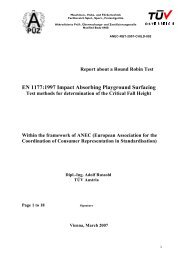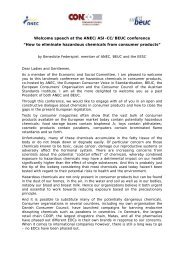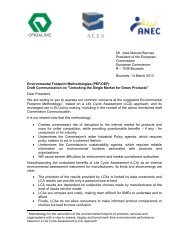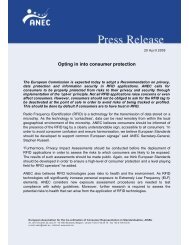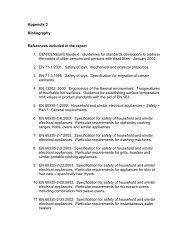Services Standards: Defining the Core Consumer Elements ... - ANEC
Services Standards: Defining the Core Consumer Elements ... - ANEC
Services Standards: Defining the Core Consumer Elements ... - ANEC
Create successful ePaper yourself
Turn your PDF publications into a flip-book with our unique Google optimized e-Paper software.
Hans-W. Micklitz<br />
The markets differ considerably in <strong>the</strong> degree to which <strong>the</strong> European<br />
Commission has achieved its policy. The European Community has adopted a<br />
whole series of directives all aimed at opening up <strong>the</strong> relevant market sectors<br />
with telecommunication and postal services being at <strong>the</strong> forefront of <strong>the</strong><br />
development, energy following suit, whereas <strong>the</strong> railway market is still ra<strong>the</strong>r<br />
closed.<br />
4. Service Directive<br />
The Service Directive 2006/123/EC 75 does not really fit into a sectoral approach.<br />
It seems as if <strong>the</strong> Service Directive is meant to establish a common framework<br />
for <strong>the</strong> “harmonisation” of <strong>the</strong> remaining services d’un seul coup.<br />
“Harmonisation” has been put in quotation marks, because <strong>the</strong> Service Directive<br />
differs from all o<strong>the</strong>r vertical subject-related approaches on services in a twofold<br />
way: first, it is not related to a particular sector – although quite a number of<br />
services are excluded from <strong>the</strong> scope of application – and second, it is not<br />
designed to harmonise services in <strong>the</strong> proper sense. Instead, <strong>the</strong> Directive<br />
should be understood as a combination of <strong>the</strong> softened country of origin<br />
principle 76 designed to establish freedom of services and freedom of<br />
establishment 77 combined with a quasi New Approach type of regulation, meant<br />
to shape <strong>the</strong> quality of services, including contractual rules. So in a way it might<br />
be misleading to classify <strong>the</strong> Service Directive as vertical strategy. The Directive<br />
has a limited scope of application by exempting, for example, labour law and<br />
health care services. However, <strong>the</strong> European Commission sticks to <strong>the</strong> idea to<br />
liberalise health care services as it was originally foreseen in <strong>the</strong> Draft Service<br />
Directive. 78 The exact scope shall be presented at a latter stage.<br />
The following table intends to classify <strong>the</strong> different types of services, consumer,<br />
transport, financial services, network services, services that come under <strong>the</strong><br />
scope of <strong>the</strong> Service Directive such as contracts with liberal professions and<br />
craftsmen and last but not least health care services.<br />
75 OJ L 376, 27.12.2006, 36.<br />
76 As defined by Wikipedia: The country of origin principle states that, where an action or<br />
service is performed in one country but received in ano<strong>the</strong>r, <strong>the</strong> applicable law is <strong>the</strong> law of<br />
<strong>the</strong> country where <strong>the</strong> action or service is performed. The opposing principle is <strong>the</strong> country<br />
of reception principle. For example, if a sale of goods is made over <strong>the</strong> Internet from a<br />
website in France to a purchaser in Italy, <strong>the</strong> country of origin principle would be said to<br />
apply if French law applied to <strong>the</strong> transaction, and <strong>the</strong> country of reception principle if<br />
Italian law prevailed.<br />
77 These are <strong>the</strong> basic freedoms guaranteed under <strong>the</strong> Treaty, <strong>the</strong> freedom to provide<br />
services all over <strong>the</strong> European Community and <strong>the</strong> freedom to establish a business site<br />
wherever in <strong>the</strong> European Community.<br />
78 See in particular COM (2004), 2 final, 25.2.2004.<br />
28







